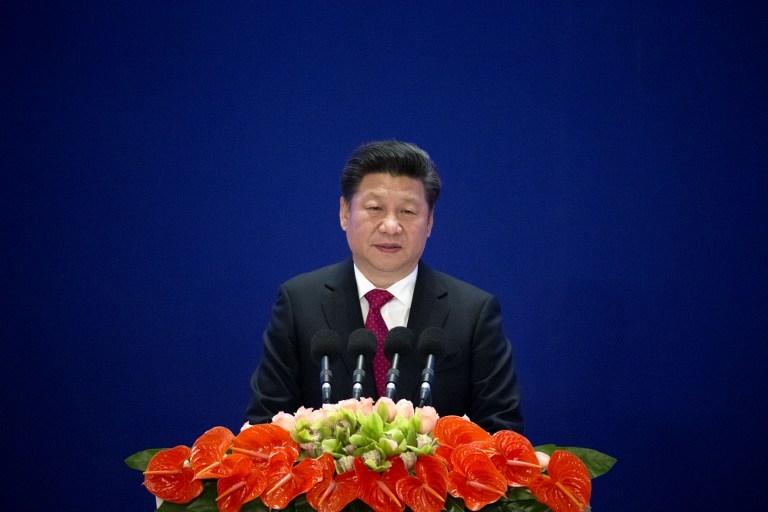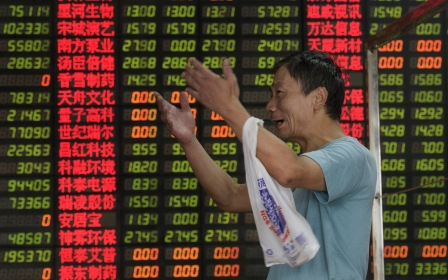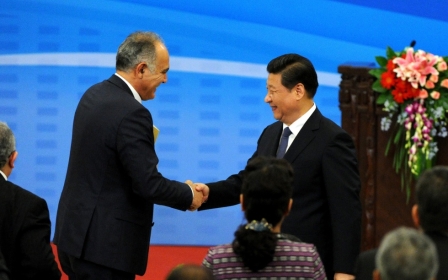China's Xi heads to Middle East in bid to bolster regional ties

Chinese President Xi Jinping on Tuesday called for closer economic ties between China and Saudi Arabia as he began a four-day Middle Eastern tour that will also take him to Iran and Egypt.
Writing in Saudi Arabia's Al Riyadh newspaper before his arrival in Riyadh, the Saudi capital, Xi called for the two nations to expand bilateral trade and to cooperate more closely in areas including nuclear energy, renewable energy and on infrastructure and aerospace projects.
“China sees Saudi Arabia as a brotherly state. An oil kingdom with huge oil and gas reserves, a country with a time-honoured history which is the birthplace of Islam, and the magnificent setting sun against the vast expanse of the desert: these are the images that Saudi Arabia brings to our mind,” Xi wrote.
China imports more oil from Saudi Arabia than any other country, at 16 per cent of the total, while also sourcing significant amounts from Middle Eastern states including Oman, Iraq and Iran. In 2014, the region supplied China with 3.2 million barrels per day, 52 percent of its oil imports.
Xi said China would also work with Saudi Arabia towards developing a China-Gulf Cooperation Council (GCC) free trade area.
Xi’s arrival in Riyadh comes with both countries facing economic headwinds, with Saudi Arabia dealing with the consequences of global oil prices slumping to below $30 a barrel, and data released on Tuesday showing Chinese growth at its lowest level in a quarter of a century at 6.9 percent.
“A review of our respective progress in economic and social development shows that China and Saudi Arabia have so much in common: both countries have followed development paths suited to their national conditions; both of us have achieved future-oriented sustainable economic development in diverse ways; and both countries have endeavoured to improve our people's lives,” Xi wrote in Al Riyadh.
Oil dependency a 'source of vulnerability'
Michal Meidan, an expert on China-Middle East relations at the Chatham House thinktank, told Middle East Eye that one of the main goals of Xi’s visit was to promote his “One Belt, One Road” policy, which aims to create a 21st century ‘Silk Road’ built on Chinese investment in infrastructure projects stretching across Eurasia to the Middle East, Africa and Europe.
“Xi is one of China’s most well-travelled presidents and he hadn’t been to the Middle East so this is a long overdue trip,” said Meidan.
“It had been postponed on a number of occasions because of regional tensions between Saudi Arabia and Iran.”
Xi’s visit comes amid heightened tensions between Riyadh and Tehran, with Saudi Arabia cutting off diplomatic ties with Iran after its embassy in the Iranian capital was attacked by protesters following the execution by Saudi Arabia of Shia cleric Nimr al-Nimr.
Zhang Ming, China’s vice foreign minister, told reporters on Monday that his country would take a “balanced and just position” regarding the region’s problems and supported countries “exploring a development path that suits their national conditions”.
"If the Middle East is not stable, I'm afraid the world can't be very peaceful. If a country or a region is not stable, it cannot realise development," said Zhang.
Meidan said that China's intention was less to mediate between Riyadh and Tehran than "hedging" China's position to ensure it continued to benefit from preferential treatment in terms of buying oil from the region, especially following the lifting of international sanctions against Iran.
"Saudi and Iran both competing for market share in china at a time when China's economy is slowing and oil demand growth is slowing," she said.
"Iraqi output is also coming along and competing for market share in China. But crude demand remains astoundingly strong. There is enough for everyone to sell to China but the question is how low due you go and much of a discount do you give to China."
China has become increasingly focused on strengthening its presence in the Middle East and established strategic partnership agreements with Iraq and Jordan last year.
Last month China also hosted a visit by Sheikh Mohammed bin Zayed al-Nahyan, the crown prince of the United Arab Emirates, in which the countries signed an agreement to cooperate in space research.
In September, Xi hosted a visit by Egyptian President Abdel Fattah al-Sisi in which the leaders agreed to cooperate more closely on economic and security issues.
Meidan said the trip was also about showing common cause with Egypt, one of its longest standing partners and allies in the region, and the policies of Sisi who has cracked down on opposition groups including the Muslim Brotherhood since seizing power in a coup in 2013.
China has faced criticism of its own for repressing Muslims and ethnic Uyghurs in its restive Xinjiang region.
With China, Saudi Arabia, Iran and Egypt all having faced criticism by human rights organisations over their use of the death penalty and other issues, Meidan said talks were likely to be “pragmatic and business-focused”.
“Human rights do not even enter into the equation and of course that contributes to relations. At a UN level it does help that they’re likeminded and can work together to alter the human rights agenda because at a bilateral level it is a non-issue.”
Full details of Xi’s schedule have not been revealed, with China’s foreign ministry only confirming that the trip will last from 19 January to 23 January.
New MEE newsletter: Jerusalem Dispatch
Sign up to get the latest insights and analysis on Israel-Palestine, alongside Turkey Unpacked and other MEE newsletters
Middle East Eye delivers independent and unrivalled coverage and analysis of the Middle East, North Africa and beyond. To learn more about republishing this content and the associated fees, please fill out this form. More about MEE can be found here.




